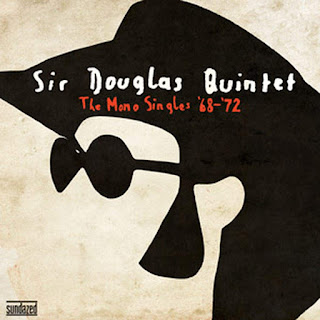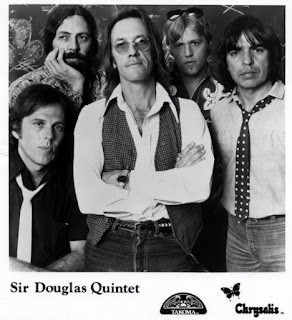The original Sir Douglas Quintet recorded a handful of songs with Meaux, scoring a Top Twenty hit in 1965 with the Tex-Mex flavored classic “She’s About A Mover.” Fleeting fame would follow, met by a string of good, but not particularly successful singles released by various Meaux-owned labels, culminating in The Best of the Sir Douglas Quintet album, a collection of the aforementioned flotsam and jetsam. When the band was arrested for marijuana possession after returning home to Texas from a 1966 European tour, Sahm got out of jail, broke up the band, and took off to San Francisco, followed shortly by the Quintet’s saxophonist Frank Morin.
Sir Douglas Quintet’s The Mono Singles ‘68-’72
In California, Sahm saw the light and formed a new version of the Sir
Douglas Quintet with friend Morin and a bunch of guys who subsequently came
and went. Playing regularly around Frisco, the band signed with a Mercury
Records subsidiary, and recorded a true debut album in 1968’s
Sir Douglas Quintet + 2 = Honkey Blues. It’s at this point that our
tale takes off and the era documented by Sundazed’s
The Mono Singles ‘68-’72 begins, the album collecting all 22 songs – 11
singles total, with B-sides – released by Mercury and its subsidiary labels
during the stated period.
While these songs have been compiled
before – most notably as part of the 2006 box set
The Complete Mercury Recordings, this single-disc set places them
firmly in the spotlight all by their lonesome selves. Whether you prefer the
mono or the stereo versions of these songs is a matter of personal taste,
really – I find myself on the fence, liking the mono versions of some songs
better, the fleshier stereo mixes of others – the groundbreaking nature and
entertainment value of the songs is beyond argument. As a rabid Doug Sahm and
Sir Douglas Quintet fan, I’m happier than an armadillo in the sun to have
multiple versions of all of these classic tunes.
The Mono Singles ‘68-’72
begins with an atypical pair of 1968 singles, “Are Inlaws Really Outlaws” and
“Sell A Song.” The former is a muted, Stax Records/Southern soul jam with
bleating horns and conversational vocals, while the latter is similar to what
Delaney & Bonnie would be doing later in the 1960s, Sahm’s R&B torch
vocals supported by Wayne Talbert’s gospel-tinged piano and scraps of guitar
until the song devolves into an improvised instrumental work-out with jazzy
horns. Both songs are interesting in a curious, prurient, historical context
but neither is indicative of the sound that the Sir Douglas Quintet would
later innovate.
Mendocino
By late ‘68, Sahm would have a reconstituted Quintet in place with his
old friend Augie Meyers on keyboards, where he belonged, and then the band
really started cooking. “Mendocino” was the result of the new band line-up,
the song’s Tex-Mex flavor enhanced by Meyers’ buoyant keys, Sahm’s understated
vocals, and a melodic hook large enough to hang your hat on. The song cracked
the U.S. Top 30, blew up even bigger in Europe, and put the Quintet back on
the international stage. The B-side was the wistful “I Wanna Be Your Mama
Again,” a mid-tempo slice of Texas soul with Sahm’s lonesome vocals, some
inspired piano-play by Meyers, and just a touch of psychedelic swirl creeping
in around the bluesy edges of the song.
“Mendocino,” the hit
single, would subsequently spawn Mendocino the album, which in turn
would yield a couple more minor hits. The first was the yearning “It Didn’t
Even Bring Me Down,” a great example of the emotionalism Sahm could bring to a
song with both words and vocals, the music a mix of horn-driven R&B led by
Morin’s tasteful tenor saxophone and Texas-flavored blues-rock. The flip side
was the jaunty “Lawd, I’m Just A Country Boy In This Great Big Freaky City,”
another homesick ode about life in bad old San Francisco that is as
alt-country in sound and texture as anything to follow by the Byrds and/or
Gram Parsons.
Sahm missed Texas something awful during his stay in
the Bay area, and it made for some great songs. The other single from
Mendocino was the wonderfully wry blues-gospel-rock hybrid “At the
Crossroads,” a slow-paced ballad with chiming organ and as mournful a vocal
performance as you’ll ever hear. Sahm’s verse “you can teach me life’s lesson,
you can bring a lot of gold, but you just can’t live in Texas, if you don’t
have a lot of soul,” is pitch-perfect in its yearning, the sentiment
punctuated by an elegant score of descending piano notes. Turn the single over
and you have the equally delightful “Texas Me,” a fiddle-driven country tale
of Sahm’s move to Frisco, a mid-tempo rocker with plenty of twang and an
undeniable yen for life back in Austin.
Together After Five
Reunited with producer Meaux, the Sir Douglas Quintet would release Together After Five in 1970. The album’s lead-off single was the mid-tempo Tex-Mex rave-up “Nuevo Laredo,” an ode to the Texas border town that features a recurring keyboard riff, joyous blasts of Mexican-influenced horns, and more than a little mariachi flavor. “I Don’t Want To Go Home” is a contemporary 1960s-styled country ballad that would have been at home in either Texas or Tennessee. It’s right about here that Sahm veers off course, The Mono Singles ‘68-’72 offering a pair of Nashville-born singles that Mercury released under the “Wayne Douglas” name in an attempt to crack the country charts.
Although both “Be Real” and the Music City remake of “I Don’t Want To Go Home” are fine examples of old-school country featuring some of the city’s best session players – folks like pedal-steel maestro Pete Drake and honky-tonk pianist Hargus “Pig” Robbins – both were a little too raw and, well, dated to appeal to then-contemporary country radio’s sophisticated “countrypolitan” audience that placed a premium on slick production and slicker appearance. Sahm returned to the Sir Douglas Quintet for 1970’s 1+1+1=4 album, from which were released a couple of singles, “What About Tomorrow” a relatively-unremarkable country-rocker and “(I Found Love) A Nice Song” a bluesy ballad with jangly piano-pounding and a dynamic vocal performance by Sahm, with just a little nuanced guitar thrown in for good measure.
The Return of Doug Saldana
To be honest, Sahm’s return from Nashville to San Francisco seemed to
only prolong the inevitable homeward journey, and the subsequent handful of
single releases seemed to be a catch-as-catch-can mixed bag of styles. “Catch
the Man On the Rise” is a bluesy rocker that walks a path that Joe Cocker
would sprint down couple of years hence, while the psychedelic tropes of
“Pretty Flower” seems an unnatural fit for the Lone Star State transplant.
Sahm finally gave in and went back home to Texas in time for 1971’s
The Return of Doug Saldana, a welcome return to form after the middlin’
country-rock of 1+1+1=4. Tex-Mex ruled the soundtrack to the
autobiographical “Me and My Destiny,” a great folk-rock song with deep roots
in the multi-cultural Texas music tradition that Sahm cherished and, indeed,
helped popularize.
The B-side of “Me and My Destiny” was a
heartfelt cover of Freddy Fender’s 1959 regional hit “Wasted Days, Wasted
Nights” which, perchance, would launch Fender’s country music stardom during
the ensuing decade. Delivered straight, as a 1950s-styled soul burner, Sahm’s
version is very cool with emotional vocals, a swinging horn line, and piano
flourishes all around. With The Return of Doug Saldana achieving mixed
commercial results, the Sir Douglas Quintet would call it a day.
Sahm appeared as a drug dealer in the 1972 film
Cisco Pike starring Kris Kristofferson, offering up the pro-drug song
“Michoacan” for the movie’s soundtrack. Released by Mercury as the last
Quintet single, the jaunty Mexican-flavored number is a mid-tempo polka
featuring Meyers’ familiar Farfisa and Sahm’s playful vocals. The B-side,
“Westside Blues Again,” is a bluesy, smoldering R&B tune that features a
great, growling Sahm vocal and scorching fretwork complimented by Rocky
Morales’ 1950s-styled tenor sax riffs.
The Reverend’s Bottom Line
Doug Sahm would launch his solo career with 1973’s acclaimed
Doug Sahm and Band, recorded with what remained of the Sir Douglas
Quintet, including Meyers and future Texas Tornados bandmate Flaco Jimenez. It
was a testament to the esteem that his fellow artists held Sahm that he was
able to enlist talents like Bob Dylan, Dr. John, and David Bromberg to appear
on his solo debut. Sahm would continue to create and record essential and
creative music throughout the 1980s and 1990s, both as a solo artist and with
the more commercially-successful Texas Tornados. Although Sahm would later
resurrect the Sir Douglas Quintet name on occasion, he’d never break as much
ground as he did with these 22 songs recorded over four years. (Sundazed Records, released
January 23th, 2011)
Review originally published by Blurt magazine, 2011



No comments:
Post a Comment